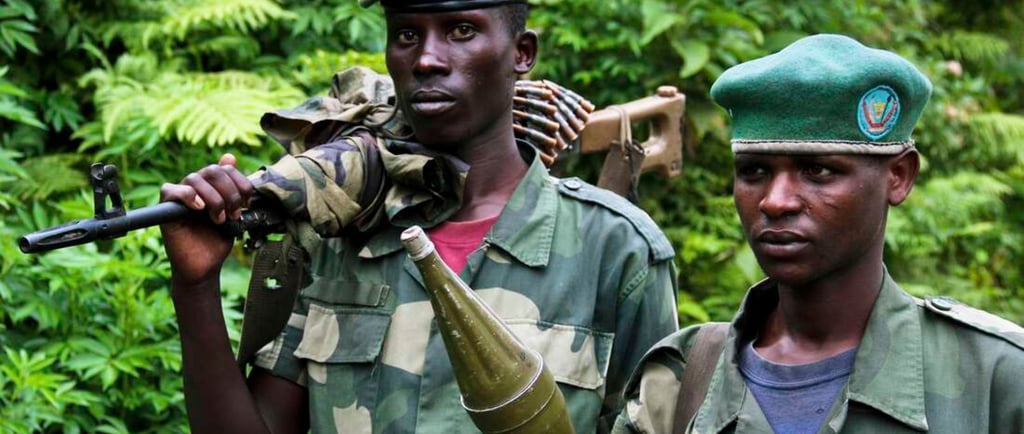Future of Conflict in DRC After M23 Movement’s Control of Goma
A new study from African Narratives examines the complex conflict in the DRC, including the M23, ISCAP, and role of regional players such as Rwanda and Kenya.
Nashwa Abdel Nabi, Political Researcher
3/6/20253 min read


The Democratic Republic of the Congo (DRC) is facing a multifaceted crisis, marked by the resurgence of the M23 rebel group (supported by Rwanda) and the increasing activity of the Islamic State Central Africa Province (ISCAP). This study explores the implications of these developments, particularly following the M23's capture of Goma.
A Dangerous New Phase
The M23's territorial gains in North and South Kivu have been significant, with the capture of Goma on January 26 marking a critical escalation. This takeover threatens to worsen the existing humanitarian crisis, which has already displaced over 400,000 people.
Regional Risks
Rwanda's support for the M23, fueled by economic interests in the DRC's mineral-rich eastern regions, coupled with the involvement of Uganda and Burundi, significantly increases the risk of a wider regional conflict. The complex interplay of these actors necessitates a nuanced approach to conflict resolution.
ISCAP's Exploitation
Simultaneously, the ISCAP has capitalized on the security vacuum created by the intensified clashes between the Armed Forces of the Democratic Republic of the Congo (FARDC) and the M23. By escalating attacks and reclaiming territory, the group demonstrates its ambition for regional expansion, further destabilizing the already volatile region.
Historical and Economic Roots of DRC Conflict
The ongoing conflict is deeply rooted in historical, geopolitical, and economic factors:
Historical Tensions: Past military interventions by Uganda and Rwanda have left deep scars and complicated the security landscape.
Ethnic Conflicts: The exploitation of ethnic rivalries, particularly between the Hutu and Tutsi, by local and regional actors fuels ongoing violence.
Resource Competition: The DRC's vast mineral wealth has become a curse, attracting external intervention and fueling conflict as armed groups vie for control of mines and smuggling routes.
The Role of Kenya
Kenya has played a key role in the search for peace in the Democratic Republic of the Congo, particularly in the eastern region, where armed conflicts continue to significantly impact security and stability. Kenya's intervention in the Congo encompasses a series of political and military initiatives launched to promote regional peace and stability. One of the prominent initiatives led by Kenya in its intervention in the Congolese conflict is the Nairobi Process, launched in April 2022. Despite its good intentions, the Nairobi Process faced significant challenges from the outset and was not able tocreate effective frameworks for involving all the key actors in the conflict, leading to a lack of trust among the concerned parties and creating tensions between Kenya and the DRC.
Recommendations for a Path Forward in DRC
To promote peace, cooperation, and justice in the region:
Re-establish and activate direct political dialogue between the heads of state of the Democratic Republic of the Congo and Kenya to ensure political engagement at the highest levels.
Resume discussions on judicial cooperation related to the regional and international judicial mechanisms for the DRC and encourage countries in the region to demonstrate strong commitment to this. Only this can halt the cycle of impunity that fuels conflict and instability in the region, as highlighted in the Framework Agreement for Peace, Security, and Cooperation for the DRC and the region.
Develop a stronger bilateral defense and security partnership between the two countries to help rebuild the security sector in the DRC.
Take into account the fact that opening borders within the framework of the East African Community (EAC) adds a new level of complexity to combating cross-border crime and terrorism in the region. This requires strengthening cooperation, improving intelligence-sharing, and enhancing regional capabilities, with additional support from global actors such as the United States.
Conclusion
The future of the conflict in the Democratic Republic of the Congo remains uncertain, dependent on the Congolese government's ability and the international community to address rising regional tensions and growing security threats from armed groups. A comprehensive approach that tackles both the immediate security challenges and the underlying causes of the conflict is crucial for a lasting peace.
Download the full study here.
About African Narratives:
African Narratives is a Pan-African non-profit research organisation dedicated to reshaping global perceptions of Africa while tackling its most critical challenges. With offices in Cairo and N’Djamena, and a diverse team of researchers spanning the continent, the think tank conducts rigorous, evidence-based research, policy analysis, and advocacy to amplify authentic African voices and perspectives.
Empowerment
Amplifying African voices for sustainable progress together.
Contact US
Growth
Street No. 3281, N'Djamena, Republic of Chad.
© 2024. All rights reserved.